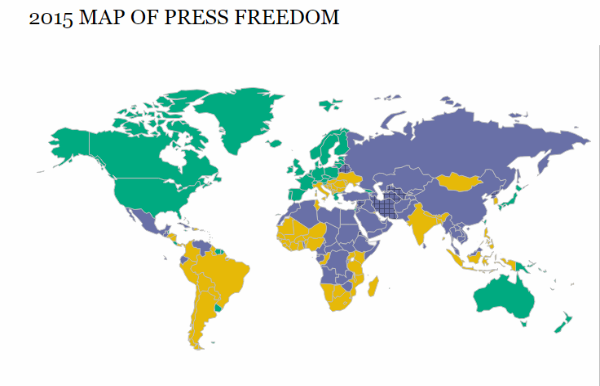Freedom House just released its Freedom of the Press 2015 report, according to which “conditions for the media deteriorated sharply in 2014 to reach their lowest point in more than 10 years.”
The report states that “journalists around the world encountered more restrictions from governments, militants, criminals, and media owners.” The “main factors driving the decline were the passage and use of restrictive laws against the media — often on national security grounds — and limits on the ability of local and foreign journalists to report freely within a given country, or even to reach it.”
“One of the most troubling developments of the past year was the struggle by democratic states to cope with an onslaught of propaganda from authoritarian regimes and militant groups,” said Jennifer Dunham, project manager of the report. “There is a danger that instead of encouraging honest, objective journalism and freedom of information as the proper antidote, democracies will resort to censorship or propaganda of their own.”
This year too Armenia, with a score of 61, was among the countries with a press that is not free. Last year, this figure was 62 (0 being the most free; 100, the least free).
According to the report: “Despite constitutional guarantees of freedom of expression, limits on press freedom persist. The authorities use informal pressure to maintain control over broadcast outlets, the chief source of news for most Armenians. There are two public television networks and dozens of private channels with varying degrees of national reach. By law, political parties are banned from owning or controlling television channels, though the owners of most channels have close ties to the government, making televised news coverage politicized.”

In the section related to the media, the report mentions that the Armenian General Prosecutor’s Office issued a statement in May that publishing information on ongoing criminal investigations is a criminal offense, and this had a “chilling effect” on the work of journalists.
Furthermore,”[a]lthough libel was decriminalized in 2010, the civil offense of ‘defamation and insult’ persists as a political weapon against traditional media. In the first half of 2014, eight defamation suits were filed against journalists, down from 16 in the first half of 2013. Violence against journalists remains a problem as well; the Committee to Protect Freedom of Expression, an Armenian nongovernmental organization (NGO), reported seven physical attacks against journalists in the first nine months of 2014.”
Freedom House also noted victories: “A draft law that proposed holding media outlets responsible for false or libelous information found in reproduced content or user comments was dropped from parliamentary discussion.”
According to the report, “[o]nline media not only continued to grow in number and plurality but also gained audience share at the expense of traditional media. Online news outlets enjoy far greater editorial, financial, and administrative independence.”
Of the 199 countries assessed in 2014, the press is free only in 63 of these countries; partly free in 71 countries; and not free in 65 countries. The US-based organization classified countries according to regions: Europe, Eurasia, the Middle East and North Africa, the Americas, Asia-Pacific, and Sub-Saharan Africa.
In Europe, the countries with the press that is the most free are Norway and Sweden (a score of 10 each); the least free, Turkey (with a score of 65). In the Middle East and North Africa, the only country with a free press is Israel (score of 30), while those with the least free press are Iran and Syria (a score of 90 each).
In the Americas, the most free press is in St. Lucia (15) with the least free press in Cuba (40). In the Asia-Pacific, the most free press is Palau (15); the least free, North Korea (97).
In Sub-Saharan Africa, the country with the most free press is Cape Verde (27); the country with the least free press, Eritrea (94).
Eurasia is the only region where there is no country with a completely free press. In terms of press freedom, Georgia (48) is in the best situation, while Russia (95) is in the worst.
Thus, the countries in the world with the most free press are Norway and Sweden, while the country with the least free press is North Korea.
Anna Barseghyan







